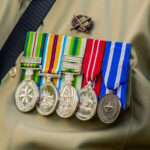The chair of a Royal Commission into defence suicides has raised the possibility of specialised training on health issues and Veterans Affairs processes.
Caring for veterans may become a distinct aspect of the general practice curriculum, as the Royal Commission into Defence and Veteran Suicides hears how doctors have struggled to meet the needs of vulnerable patients.
Announced in mid-2021, the Royal Commission has already released an interim report with recommendations, but the final report won’t be out until June 2024.
It’s currently in its 10th round of hearings.
On Tuesday the commission heard from retired army corporal William Kearney, who served between 1972 and 1987 before becoming a volunteer advocate for other veterans trying to obtain their entitlements from the Department of Veterans Affairs.
In a statement submitted to the Royal Commission, Mr Kearney detailed his experiences working as a peer advocate and encountering veterans dealing with both the emotional and physical scars of war while trying to work with a hostile system.
Typically, he said, filling in paperwork for a primary claim with the DVA would take between two and two-and-a-half hours.
For more complex cases involving submissions to the Administrative Appeals Tribunal, paperwork alone could take up to 20 hours.
With a system that was opaque and bureaucratic even for the group of people that it was made to benefit, it’s perhaps unsurprising that some doctors had what Mr Kearney described as a poor grasp of DVA processes.
“You would explain to them how the repatriation card system worked, like the difference between a White Card and a Gold Card – which my current GP didn’t know there was a difference until recently,” he said.
“And when I was at Wadeye, there was a GP there that believed that the Gold Card was hereditary, that the wife of a veteran would automatically get one on their demise.”
The difference between the cards is what they cover – while Gold allows veterans to get all clinically required healthcare for 115% of the Medicare rebate, the White Card only works for treatment relating to service-related injuries.
Rising cost pressures have recently forced some clinics to stop bulk billing even DVA card holders.
Mr Kearney also discussed the fact that even GPs who were interested in learning more about the machinations of the DVA were lumped with almost prohibitive paperwork.
“I [was talking to] my local GP about a fortnight ago, and she held up a pile of papers and said ‘this is what I get from Veterans’ Affairs, I get so much information that I never get time to read any of it,’” he said.
“So I think time would be the limiting factor there. She works 10 hours a day now … that’s going to make it hard for her.”
When Mr Kearney pitched the idea of creating a veteran-specific healthcare training module at a local university, he said he was shut down by other members of the support organisation he volunteered with.
At the conclusion of Mr Kearney’s evidence, Royal Commission chair Nick Kaldas mentioned that a UK program run through the Royal College of General Practitioners which provides training for doctors interested in veteran health.
“[On] the issue of GPs being aware of military issues and veteran issues, the UK have a program that we are considering at the moment where a number of GPs go through a short, sharp program and then they become accredited as being military specialists,” Mr Kaldas said.
“In fact, a lot of people who are going through medical training in the first instance in the UK actually … have a component in relation to military awareness.”
It’s unclear whether Mr Kaldas’ use of “we” refers to discussions with other Royal Commissioners or discussions with the DVA.
The Medical Republic has requested clarification from the DVA.
It definitely was not the RACGP, which confirmed with TMR that it had not been approached about creating such a unit but welcomes ways to upskill GPs on veteran health.
“RACGP GP training includes a curriculum unit on military and veteran health which provides registrars with skills and knowledge on the specific needs of veterans,” the college said.
“We work with the Department of Veterans’ Affairs to promote resources and clinical information relevant to veterans to GPs.
“Our Military Medicine and Veterans’ Health Specific Interest Group also creates a space for upskilling and resource development.”
Retired army officer Stuart McCarthy, an advocate for veterans’ health, said Mr Kaldas’ comments on the prospect of training and accreditation for GPs were “encouraging”, but that the government also needed to address other barriers to care – chiefly the inadequacy of DVA schedules of fees for GPs and other health practitioners.
One particular health issue Mr McCarthy and other have tried to get addressed is the exposure of soldiers to the antimalarial drugs mefloquine and tafenoquine, which he says has led to serious and chronic health issues requiring specialist care, diagnostics and referrals.
“The neuropsychiatric conditions resulting from those drug exposures are typically misdiagnosed or mistreated as PTSD, which unfortunately contributed to suicidality among significant numbers of military veterans,” he told TMR. “To improve this, we would need to see referrals to specialists with expertise in treatment and rehabilitation of acquired brain injuries.
“Our proposed outreach program for affected veterans and their health care providers was rejected several years ago by the previous government. If this government was to introduce a GP training and accreditation program along the lines of what’s being done in the UK, awareness of the healthcare needs of mefloquine and tafenoquine veterans would be an important and probably life-saving aspect of this program.”
The RCGP training module Mr Kaldas was referring to has been taken up by 2000 practices across England, with 84% of participating clinics reporting that they feel they have a better understanding of veteran needs.
Accreditation under this system is voluntary and free.
Following training, GP practices must commit to asking new patients whether they have ever served in the defence force, record it in their file if they have and nominating a clinical lead on veterans within the surgery who then stays up to date on new research.
According to the RCGP website, some of the strongest benefits of the program include capturing better epidemiological data and improving rapport between veterans and doctors.





